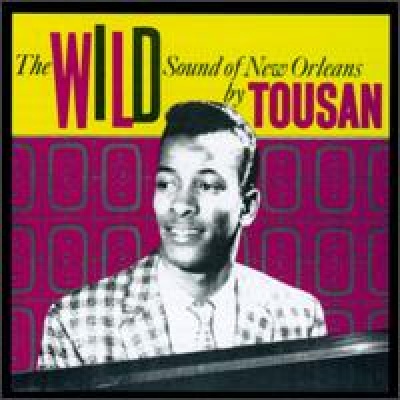
The Wild Sound of New Orleans
by Lindsay PlanerThese dozen sides represent Allen Toussaint's earliest solo recordings for RCA Records circa 1958. Toussaint was essentially discovered by Danny Kessler -- an early version of what would now be considered an A&R man. It was during another artist's studio time -- featuring Toussaint as the accompanying pianist -- that Kessler first heard and approached Toussaint to prepare a few instrumentals of his own. On January 29, 1958, Toussaint (piano) was joined by a local crew that included Alvin "Red" Taylor (baritone sax), Nat Perrilliat (tenor sax) or Lee Allen (tenor sax), either Justin Adams (guitar) or Roy Montrell (guitar), Frank Fields (bass), and Charles "Hungry" Williams (drums). As intimated above, the precise personnel has long been debated. Kessler produced an outing that yielded the infectiously up-tempo blues "Whirlaway" and the Ray Charles-inspired gospel-meets-barrelhouse-meets-swing title "Happy Times." Kessler turned the pair into a locally successful single and was so encouraged by the results, less than a month later the same assemblage gathered to record the remainder of what would be the Wild Sound of New Orleans (1958). The soulful "Up the Creek" is a dark waltz with Toussaint's stirring keyboard runs emphasizing the haunting refrain. On the opposite side of the emotive spectrum, the hearty "Tim Tam" is impelled by Williams' hard and heavy backbeat with Allen blowing his lungs out. Another contrast follows with the whimsical "Me and You." The melody is decked out with a classy early 20th century pop standard feel, while all the more striking is the percussive accompaniment replicating a tap-dancer doing an old soft shoe. Immediately, Toussaint's expressive keyboarding on "Bono" and "Nashua" give props to the performance style of Professor Longhair before settling into their respectively catchy, mid-tempo rhythms. The horns have plenty of room to strut their proverbial stuff and the syncopation of the latter immediately brings Mardi Gras to mind. Perhaps the best-known tune among the lot is the jaunty "Java," which took on new life thanks to a chart-topping remake by Al Hirt. The trumpeter turned it into his unofficial theme song, ultimately making a 30-plus-year career out of it. "Wham Tousan" and "Pelican Parade" each quickly rev up to full throttle with the saxes taking on and going head-to-head with Toussaint's rollicking runs up and down the 88s. The German-label import Complete "Tousan" Sessions (1992) from Bear Family is a good way to get the 12 songs found here. It also boasts the complete and rarer Seville label material that the artist cut and issued under the moniker "Al Tousan."
